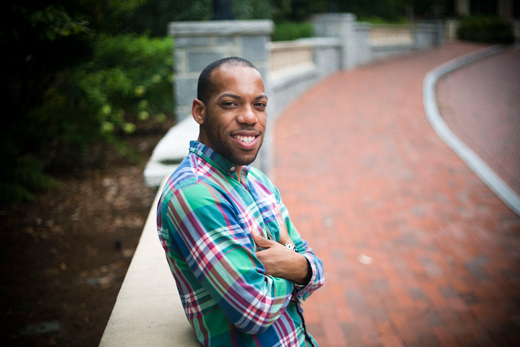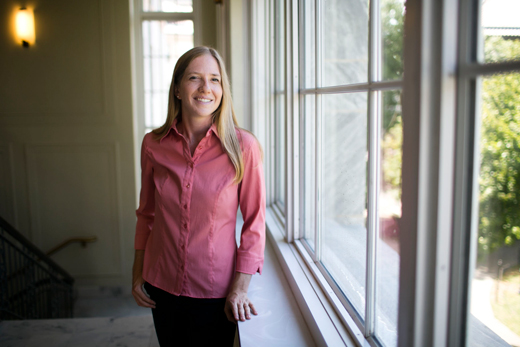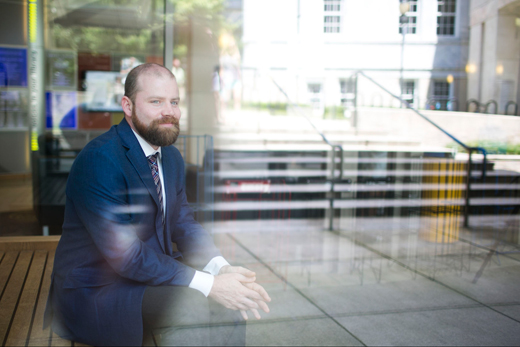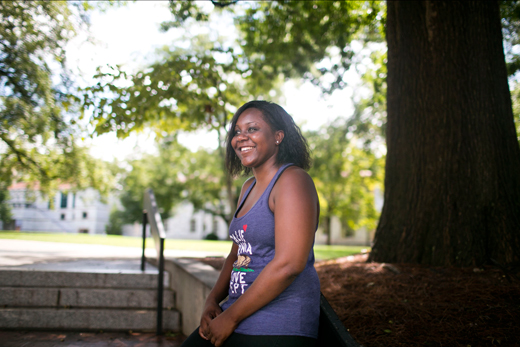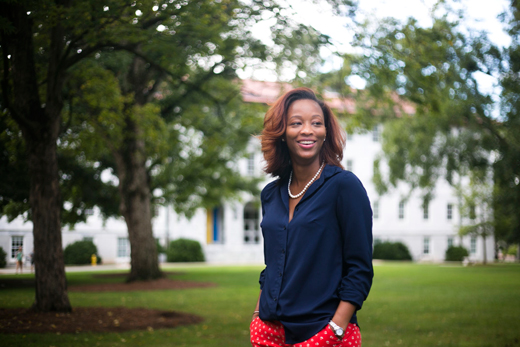Undergraduates aren't the only new students arriving on campus for the start of the 2015-16 academic year. With prestigious degrees already in hand, a new group of graduate students comes to Emory ready to contribute new knowledge to a variety of pressing issues, from the impact of HIV on poor communities to how the brain adapts to chronic stress.
This fall, Emory's Laney Graduate School welcomes 358 new students, representing 37 countries. The vast majority, 83 percent, are pursuing doctoral degrees, and many are drawn by the university's reputation for interdisciplinary, collaborative scholarship.
"I chose Emory because my research interests are closely aligned with those of the faculty in my department and faculty in other departments such as public health, African studies and psychology," explains Tatenda Mangurenje, who is pursuing a PhD in cultural anthropology to study how HIV's shift to a chronic disease impacts poor communities like those in her native Zimbabwe.
Sherod Haynes, who plans to complete his PhD in neuroscience at Laney Graduate School and an MD at Georgetown University School of Medicine, cites similar reasons for coming to Emory to study chronic stress and the neural circuits implicated in psychiatric disorders.
"I chose Emory because I found it extraordinarily collaborative and student-centered, with unparalleled resources as compared to other top-tier institutions I considered," Haynes says.
"As an MD/PhD student, it was really important to train at an institution with a strong focus on translational neuroscience, as ultimately I hope to bring advances made in the lab to the patient's bedside," he continues. "Emory is very committed to that."
Emory's interdisciplinary strengths extend from the sciences to the humanities.
"Emory has an excellent Disability Studies Initiative and is very supportive of interdisciplinary work and research, both of which appeal to me," notes Rachel Kolb, who chose Emory to pursue her PhD in English, focusing on representations of disability in American literature.
"I am looking forward to working with these groups as well as the faculty members here, and to joining a vibrant community of scholars during the next few years," she says.
Laney Graduate School Dean Lisa Tedesco praises the new cohort of graduate students for choosing "to dedicate themselves to rigorous study, research and discovery."
"Trained by an internationally recognized and diverse graduate faculty, these students will be challenged and inspired to new heights of scholarship," she says. "They truly are tomorrow’s intellectual leaders, and we are delighted to welcome them to the Laney Graduate School and the larger Emory community."
Get to know just a few of the new graduate students who have chosen Emory for the next chapter in their academic careers:
Haylee Christine Harrell
Hometown: Salt Lake City, Utah
Emory degree program: PhD in women's, gender and sexuality studies
Completed degrees: BA in English with honors, minor in ethnic studies, University of Utah
Focus of scholarship: I am interested in exploring how to use theater as a platform for speaking verbally and nonverbally about multi-ethnic bodies and sexuality. In my exploration I am interested in a redefining of the stage and consequently stage plays as something that can be witnessed on a street corner by any passing spectator.
Why it matters: Early in my undergraduate career, playwriting became my own personal platform for speaking out about ethnicity and sexuality in a state where certain issues can be, and usually are, suppressed. Beyond my own personal connection with the topic, I feel as though it is important to bring a creative form such as playwriting to a general population — allowing them to use verbal and nonverbal communication to bring characters, resembling themselves or others, alive.
Proudest academic achievement to date: For my honors thesis I was able to write, direct and act in a monologue and two one-act plays that depicted the changing views of my own ethnic identity and status as a first-generation student over my three years at the University of Utah. The performance of my thesis also led to me being nominated, and later chosen, as the undergraduate speaker at the College of Humanities Convocation.
Sherod Haynes
Hometown: Chicago, Illinois
Emory degree program: PhD in biological and biomedical sciences – neuroscience
Completed degrees: BA in biology/neuroscience, Carleton College
Focus of scholarship: I am interested in exploring the neural circuits implicated in psychiatric disorders. More specifically, I wish to focus on how various brain regions that regulate motivation, emotions and executive decision-making are affected by chronic stress. Using animal models of chronic stress, I want to classify the types of adaptations they undergo, thereby yielding insight into hallmark dysfunctional behaviors that typify diseases like depression, PTSD and schizophrenia.
Why it matters: As a medical student at Georgetown, on my psychiatry rotation, I encountered many patients with severe illness for which medication had simply failed. This experience instilled in me the deep desire to better understand these illnesses in order to develop novel therapies that precisely target the problem and yield better outcomes. With such rapid advancements in neuroscience, now more than ever before, scientists are capable of truly targeting maladaptive behaviors such as addiction, phobias and depression and pinpointing the specific neurons that are implicated. I am drawn to this extraordinary challenge.
Proudest academic achievement to date: Surprisingly, my biggest academic achievement has little to do with neuroscience or medicine whatsoever. In addition to an interest in the inner workings of the brain, I have an undying passion for dance. I have been most proud of the academic fellowships and grants I was awarded to perform and teach dance all over the world. Perhaps it is the balance of being able to pursue academic dance while pursuing science/medicine that I am most proud of, as it has been difficult pursuing both. Regardless, it is something I hope to continue and eventually plan to merge the two at some point in my career.
Rachel Kolb
Hometown: Albuquerque, New Mexico
Emory degree program: PhD in English
Completed degrees: BA and MA in English, both from Stanford University; MSt in English, 1900-present, and MSc in education, both from Oxford University
Focus of scholarship: I am especially interested in how various writers have represented disability in 19th and 20th century American literature, and how this intersects with larger political contexts of inclusion. I am also interested in the medicalization of disability, in terms of the language we use to describe the body and its conditions.
Why it matters: I am deaf myself, and that has informed my perspectives on the importance of exploring disability in relationship to individual experiences and larger social attitudes. Narrative has a powerful impact on how we classify groups of people. Being critical about narrative helps us deconstruct the historical and ideological contexts that have shaped our understanding of the human experience.
Proudest academic achievement to date: I am most proud of being able to spend the last two years studying overseas at Oxford on a Rhodes scholarship. During my time in the United Kingdom, I wrote a master's thesis about how disabled characters in the novels of William Faulkner and Carson McCullers defy normative expectations for linguistic self-expression.
Robert W. Kubiak II
Hometown: Hornell, New York
Emory degree program: PhD in chemistry
Completed degrees: BS in biology and chemistry, D'Youville College
Focus of scholarship: As a graduate student, I will be performing novel research in the area of carbon-hydrogen functionalization. C-H functionalization bypasses the need for complex functional groups — which are required in traditional organic synthesis — saving time, money and reducing the waste associated with synthesis.
Why it matters: I like C-H functionalization because this area is new, relevant and rapidly changing the way we think about the logic of organic synthesis. Emory is a part of the Center for Selective C-H Functionalization (CCHF). As a researcher within the CCHF there is unlimited potential to collaborate with many of the leading experts in a wide range of chemical disciplines both in the United States and abroad.
Proudest academic achievement to date: While serving in the military, I graduated as the honor graduate from the Special Operations Combat Medical Course (SOCM). My time at SOCM both inspired me and gave me the confidence to explore my curiosities about the surrounding world through scientific endeavor.
Tatenda Mangurenje
Hometown: Gweru, Zimbabwe
Emory degree program: PhD in cultural anthropology
Completed degrees: BS in anthropology, BA in psychology and history, University of Arizona
Focus of scholarship: I would like to examine the shift of HIV/AIDS from a death sentence to a manageable chronic disease in poor communities, specifically in southern Africa.
Why it matters: Being from Zimbabwe, HIV/AIDS has been a huge part of my life and after watching many family members succumb to the virus, it is incredible that it can now be managed with lifesaving medications. I believe this topic is important because millions of people are living with this disease worldwide and as we have seen with other chronic diseases such as diabetes and heart disease, their management can be challenging. As a result, it is important for researchers to examine how individuals, communities and nations are able to handle this new influx of chronic disease sufferers and assist public health institutions in providing sustainable solutions to chronic disease management.
Proudest academic achievement to date: In September 2011, during my last semester at the University of Arizona, I had a life-threatening accident that left me bedridden for four months. Following this incredibly trying time, I returned to the university and declared a major in anthropology. I am most of proud of my determination and hard work following this accident because without it, I would not be joining this prestigious institution.
Buffy Mosley
Hometown: Ft. Worth, Texas
Emory degree program: PhD in business marketing
Completed degrees: BS in computer science from Spelman College; MBA in marketing from Georgia State University
Focus of scholarship: I have an interest in marketing and advertising strategy from the lens of customer engagement, purchasing trends and branding. What makes consumers notice a particular brand, where to place certain advertisements, what sort of advertising visuals or messages engage consumers and move them to purchase – currently those are the types of questions that intrigue me.
Why it matters: I’ve always been interested in creative design and with my computer science background, my interests have veered more towards digital marketing and advertising design strategy. I think the digital shift in consumer consumption provokes some interesting dilemmas and possible discoveries of how traditional modes of marketing and advertising are shifting.
Proudest academic achievement to date: One of my biggest regrets leaving Spelman was not studying abroad. I always thought it was a missed opportunity. While getting my MBA, I was accepted into a marketing abroad program in Europe. I was ecstatic. I took courses in European marketing and management at a top business school in Toulouse, France. This is one of my biggest most satisfying accomplishments. It was my very first time traveling outside the country and I didn’t know even the tiniest bit of French. It was an immeasurable experience that I will never forget.
Miriam Van Dyke
Hometown: Oxford, Alabama
Emory degree program: PhD in epidemiology
Completed degrees: BS in nuclear medicine technology, University of Alabama at Birmingham; MPH in epidemiology, Emory University
Focus of scholarship: I am primarily interested in how place, race and socioeconomic status (e.g., income, education and wealth) intersect to impact health. For example, how do the life experiences of African Americans with low socioeconomic status (SES), living in low SES environments, differ from those of whites or Hispanics living in the same situations? How do these factors influence health? Are the effects the same, or different, depending on an individual’s racial/ethnic background?
Why it matters: I am drawn to this topic because of my personal experience as an African American woman from a lower-SES background. However, in general, I believe it is critically important to understand how social stratification in America impacts health.
Proudest academic achievement to date: As a high school senior I was awarded a Gates Millennium Scholarship — a scholarship that would fully fund me to obtain a bachelor’s, master’s, and even a doctoral degree. It was provided by the Bill and Melinda Gates Foundation and the United Negro College Fund. The scholarship changed my life. Even with a bachelor’s and master’s degree under my belt, I still attribute a lot of my success today to this scholarship.


